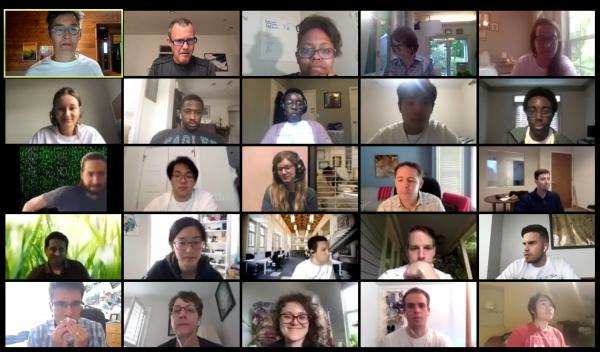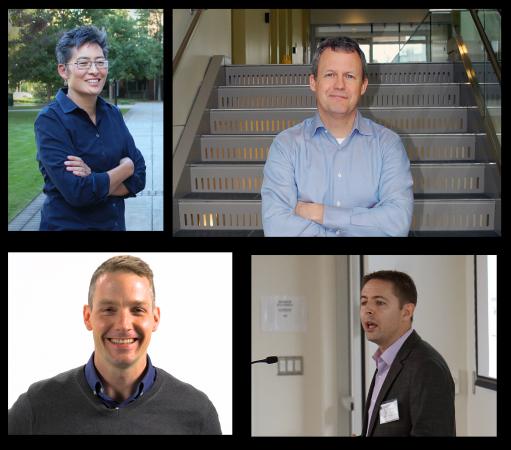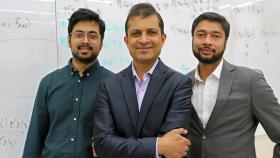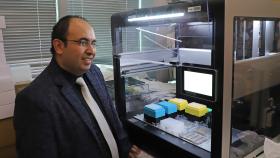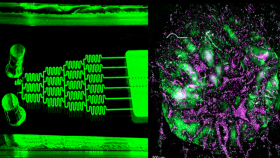Last year, the Georgia Institute of Technology and Emory University launched the Computational Neural Engineering Program (CNEP). Supported by the National Institutes of Biomedical Imaging and Bioengineering (NIBIB), part of the National Institutes of Health (NIH), a collection of world class faculty researchers is training a new generation of multidisciplinary researchers working at the intersection of computational neuroscience, data science, and clinical neurophysiology.
They all gathered, from a distance, for the CNEP’s first annual online retreat (September 25-26). The online event – which drew 18 grad students (trainees), 11 faculty members, two staff members, and three advisory board members from the neurotech industry – was sponsored by the Georgia Tech and Emory Neural Engineering Centers, and the Laney Graduate School at Emory.
The wide ranging of retreat foci took in science, technology, neuro-ethics, diversity and inclusion, with time for a neuro-themed quiz show. Meanwhile, second year PhD students – that new generation – presented their research, which focused on, among other things, topics such as machine learning methods for decoding brain activity, and brain imaging techniques for understanding Alzheimer’s disease. And a neuro-ethics exercise sparked a lively discussion about the societal impact of brain-enhancing technologies, with real-world examples.
In spite of the physical distance between the attendees, they found a sense of community, with plenty of break-out sessions that promoted multiple interactions. This included a team Jeopardy event over home-delivered pizza (which took some nifty coordination), and an interactive session on identity development, intersectionality, and privilege, and the affect how these things can have on professional, academic, and personal lives.
The retreat is just one facet of the training program currently being carried out remotely, according to the CNEP leadership team: Garrett Stanley and Lena Ting, professors in the Wallace H. Coulter Department of Biomedical Engineering at Georgia Tech and Emory; Chris Rozell, professor in Georgia Tech’s School of Electrical and Computer Engineering; and Michael Borich, assistant professor in Emory’s Department of Rehabilitation Medicine, Division of Physical Therapy (all four also are members of the Petit institute for Bioengineering and Bioscience at Georgia Tech).
Trainees and faculty are also taking part in monthly workshops and weekly seminars that focus on technical training and professional development.
With an award from NIBIB of nearly $1 million, CNEP was designed to take advantage of the explosive development of new tools for measurement and manipulation of nervous system function, with the goal of addressing challenges posed by the growing threat of neurological diseases and disorders on an expanding senior population. The program supports the development of PhD students in Biomedical Engineering at Georgia Tech and Emory, as well as Bioengineering, Electrical and Computer Engineering, and Machine Learning at Tech, leveraging the growing strength of Neural Engineering at both universities.
Media Contact
Latest BME News
Researchers demonstrate stem cell treatment without chemotherapy and painful bone marrow procedure
BME researchers explore the critical role of mechanical force in rare genetic disorder
Researchers develop spatial transcriptomics toolkit that provides new insights into the molecular processes of life
Air Detectives take top prize to give department three straight victories in Expo competition
Coulter BME community gathers at the Fabulous Fox to celebrate anniversary of unique public-private partnership
Coskun pioneering new research area and building a company around iseqPLA technology
BME undergraduate student and competitive skater Sierra Venetta has found success on and off the ice
BME researcher Ankur Singh using new technology to uncover weakened response in cancer patients

